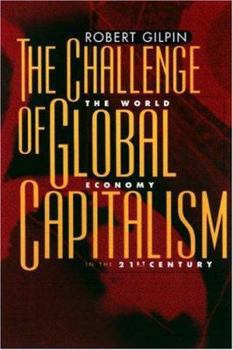The Challenge of Global Capitalism: The World Economy in the 21st Century
Select Format
Select Condition 
Book Overview
Many individuals proclaim that global capitalism is here to stay. Unfettered markets, they argue, now drive the world, and all countries must adjust, no matter how painful this may be for some. Robert Gilpin, author of the widely acclaimed Political Economy of International Relations (Princeton, 1987), urges us, however, not to take an open and integrated global economy for granted. Rather, we must consider the political circumstances that have enabled global markets to function and the probability that these conditions will continue. Gilpin's new book amounts to a magisterial inquiry into all major aspects of the contemporary world political economy. Beginning with the 1989 end of the Cold War and the subsequent collapse of communism, it focuses on globalization and rapid technological change and covers a broad sweep of economic developments and political cultures. Gilpin demonstrates the fragility of a global and integrated economy and recommends what can be done to strengthen it. The international community has another chance to solidify the global market economy that collapsed with the outbreak of World War I. Yet, writes Gilpin, the full implications of this historic development for international affairs are not yet clear. Will socialist economies make a successful transition to market-type economies? What role will a dynamic China play in the world economy? Will the United States continue to exercise leadership or gravitate toward self-centered policies? Gilpin explores such questions along with problems in the areas of trade liberalization, multinational corporations, and destabilizing financial flows. He also investigates the struggles of less developed countries and the spread of economic regionalism, particularly in Europe, North America, and Pacific Asia, which directly threatens an open world economy. The author maintains that global capitalism and economic globalization have rested and must continue to rest on a secure political foundation. However, this foundation has eroded since the end of the Soviet threat. To ensure survival of the global economy, Gilpin concludes, the United States and other major powers must recommit themselves to working together to rebuild its weakened political foundations.
Format:Hardcover
Language:English
ISBN:0691049351
ISBN13:9780691049359
Release Date:February 2000
Publisher:Princeton University Press
Length:408 Pages
Weight:1.60 lbs.
Dimensions:1.3" x 6.0" x 9.0"
Customer Reviews
2 ratings
The Challenge of Global Capitalism: The World Economy in the 21st Century
Published by Thriftbooks.com User , 18 years ago
Come in time for my college class. Arrived in excellent condition --- new book. Great price below campus book store prices.
Don't fear Globalization, just fix it.
Published by Thriftbooks.com User , 24 years ago
In The Challenge of Global Capitalism Robert Gilpin asserts: "The Achilles heel of the post-Cold War world order is the poor public understanding of economic liberalism, of the functioning of the market system, and of how capitalism creates wealth." That heel was showing in Seattle during the WTO meetings last November and again April 16-17 in Washington when in-your-face, "Globalize-This!" protestors tried to block IMF and World Bank meetings. The protestors would serve themselves and their causes well by reading Gilpin's book, which explains how the global economy has developed over the last half-century to reach the current stage of globalization, defined by Gilpin as "the increasing linkage of national economies through trade, financial flows, and foreign direct investment by multinational firms." Globalization holds great potential for good and presents serious challenges. The principal challenge, according to Gilpin, is to find ways to fortify the international financial system against future threats to global economic stability like those caused by the East Asian economic crisis and resulting global economic turmoil of the late 1990s. Although economists and Western governments are not in agreement on all the specific measures to adopt to prevent international financial crises in the age of globalization, most do expect the IMF to play a necessary, constructive role in behalf of international financial stability. Gilpin educates about globalization, but not as an apologist. Rather, he is quick to point out globalization's faults and to call for corrective measures. Gilpin insists "the fears arising from globalization must be addressed and must not be rejected out of hand." In the United States this means "solutions must be devised for the problems of growing income inequality, the plight of low-skilled workers, and job insecurity. Reforms should include strengthened safety nets, greatly expanded job training, and a new social contract between capital and labor."





